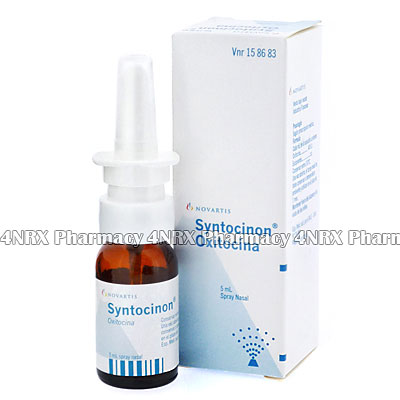 |
Home  Milk Supply Milk Supply  Syntocinon (Oxytocin) Nasal Spray Syntocinon (Oxytocin) Nasal Spray |
|
|||||||||
|
Syntocinon (Oxytocin) Nasal Spray (ox-e-TOW-sin)
What is Syntocinon (Oxytocin) Nasal Spray used for? Syntocinon (Oxytocin) Nasal Spray is used for the inducement of contractions. In addition it is used for the stimulation of labour in woman who have too week contractions. Beyond that oxitocin is known as an excellent bleeding controller and preventer. Syntocinon may also be applied during a caesarian section and for the management of certain types of miscarriage. Syntocinon comprises a synthetic version of the naturally occurring body hormone oxytocin. The oxytocin causes the muscles of the woman's uterus to contract during contractions so that the suckling can be pressed out. Towards the end of pregnancy, oxytocin normally is released naturally by the brains pituitary gland to stimulate the muscle of the uterus. Synthetic oxytocin is designed to activate contractions for medical reasons and for those cases when contractions do not start naturally. The dosage is regulated until the point is reached that the created contractions are raised to a natural pattern of normal labour. Beyond that synthetic oxytocin may also be used for the stimulation of contractions which have started naturally, but are considered too weak to press out the suckling. In such circumstances syntocinon will be able to support the strengthening of the contractions of the uterus. After birth syntocinon can be prescribed for the prevention of heavy bleeding and to support the compression of the placenta. How should I use Syntocinon (Oxytocin) Nasal Spray? For the dosage and administration of syntocinon nasal spray please consult your physician and discuss with him your individual case. Your physician or delivery nurse will decide when and how to treat you with syntocinon. Usually syntocinon is thinned before use and is given as an intravenous infusion into one veins. What are the side effects of Syntocinon (Oxytocin) Nasal Spray? As specified below there are certain side effects aligned with syntocinon. Some women may experience those; others will not be affected by any of the following symptoms. Please consult your physician in case you do observe any unwished effects, since some of these side effects need medical assistance. Side effects woman commonly reported are:
Uncommon adverse reactions woman reported:
The following side effects are rather rarely observed but they do occur. Meant are allergic reactions such as:
Please Note Syntocinon shall not be used if one has known allergies against the active agent oxytocin. In case you do observe an allergic reaction, end the medication and directly inform your physician or pharmacist. In addition the application of syntocinon is not recommended in cases of:
Syntocinon should not be used for on-going periods if:
Further Information Your physician may advise you to keep the amount of fluids at a minimum during the application of syntocinon. 
|
|||||||||||||||||